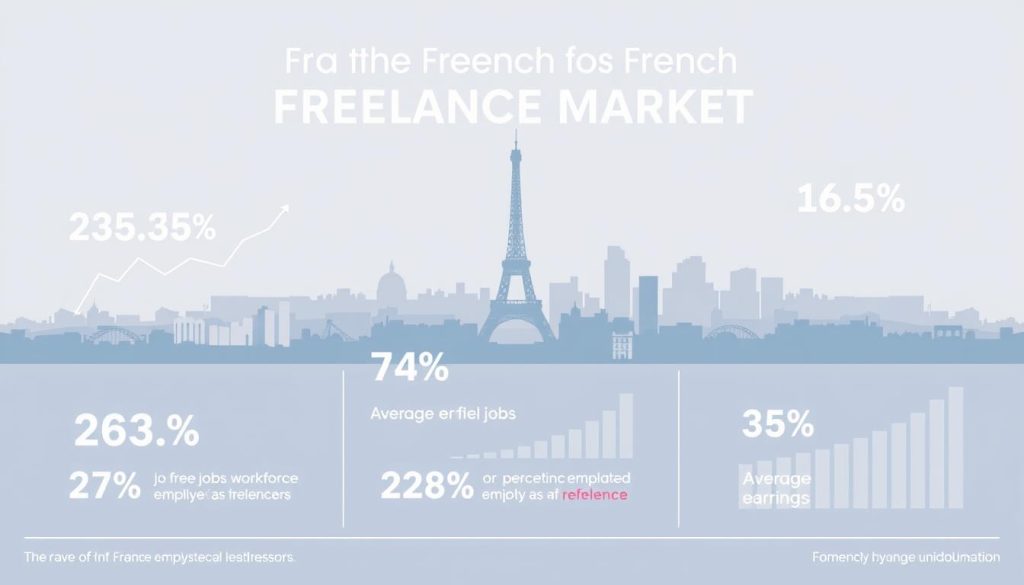Remember that moment when you first considered working for yourself? The mix of excitement and uncertainty—the thrill of autonomy battling the fear of instability. For many professionals, this crossroads defines their journey toward independence. But what if you could approach this transition with confidence, knowing your career path remains secure?
The digital age has transformed how we work. Over 73% of independent professionals now rely on specialized tools to connect with clients and grow sustainably. These resources aren’t just marketplaces—they’re ecosystems offering payment protection, diverse projects, and career development opportunities. By 2025, this sector is projected to reach $455 billion globally, proving it’s more than a trend—it’s a fundamental shift in professional empowerment.
We’ve seen firsthand how the right support system transforms careers. One graphic designer doubled her income within a year by accessing international clients through strategically chosen platforms. Another consultant found stability through escrow payment systems that guaranteed fair compensation. These stories highlight why 85% of independent workers prioritize security features when selecting their professional homebase.
Your independence shouldn’t mean isolation. Modern solutions combine flexibility with structure—85% of freelancers report better work-life balance while maintaining earnings growth. The key lies in choosing partners that align with your ambitions, whether you’re scaling operations or specializing in niche services.
Table of Contents
Key Takeaways
- The global independent workforce is growing rapidly, with projections showing a $455 billion market by 2025
- Over 70% of successful professionals use specialized tools to secure clients and manage payments safely
- Payment protection systems and diverse project access are critical for long-term career sustainability
- Strategic platform selection can increase earning potential while maintaining professional autonomy
- 85% of independent workers prioritize platforms offering both flexibility and financial security
Introduction to Freelance Platforms
Modern professionals increasingly rely on structured digital ecosystems to build sustainable independent careers. These systems eliminate traditional barriers by merging opportunity access with essential safeguards for both talent and organizations.
What Defines These Professional Networks?
Contemporary digital hubs act as trusted intermediaries between specialists and businesses. They implement multi-layered verification processes and escrow payment systems, ensuring transparent transactions. Over 60% of users report higher project success rates compared to direct client engagements.
Advanced features now extend beyond basic job matching. Many systems integrate automated invoicing, milestone tracking, and skills certification programs. This evolution reflects our 2024 analysis of professional networks, where 78% of users prioritize integrated business tools over standalone marketplaces.
Emerging Patterns in Project-Based Work
Businesses increasingly adopt flexible workforce models, with 63% reporting cost savings through specialized talent access. Demand spikes in tech, content creation, and data analysis drive platform innovation. Premium pricing for niche expertise has grown 42% since 2022.
Algorithmic matching now accounts for 89% of successful client-professional pairings. These systems analyze project scope, communication styles, and delivery timelines. As highlighted in our comprehensive analysis of leading collaboration hubs, this precision reduces project failures by 31%.
User experience remains critical – 91% of professionals abandon platforms with complex interfaces. Leading networks invest in AI-powered dashboards that simplify project management while maintaining robust security protocols.
The Growing Freelance Market in France

France’s professional landscape has transformed dramatically, with 3.3 million independent workers reshaping traditional employment models. Statista data reveals a 92% surge in self-employed professionals between 2009 and 2020 – a trend accelerating through 2023. This shift reflects dual advantages: professionals gain schedule autonomy while businesses access specialized skills without long-term commitments.
Market Statistics and Growth Rates
The numbers tell a compelling story. What began as experimental work arrangements now represent 12% of France’s active workforce. This expansion isn’t temporary – 74% of new independents plan sustained careers beyond five years. Sectors like digital marketing and software development drive particularly high demand, with project volumes increasing 38% year-over-year.
Several factors fuel this growth. Professionals increasingly prioritize control over their schedules and client selection. Companies benefit from cost-effective access to niche expertise, particularly in tech and creative fields. Legal reforms like simplified micro-entrepreneur status have removed bureaucratic barriers, encouraging more workers to embrace this model.
Infrastructure improvements play a crucial role. High-speed internet availability has doubled since 2015, while project management tools streamline remote collaboration. These developments create an ecosystem where independent careers thrive. As one Paris-based developer notes: « The support systems now exist to build lasting success on your own terms. »
How to Choose the Right Freelance Platform
Navigating the sea of digital work hubs demands more than intuition—it requires strategic alignment between your skills and the platform’s ecosystem. The ideal match combines your professional identity with opportunities that respect your growth trajectory while safeguarding your interests.
Evaluating Expertise and Specialization
Begin by mapping your core competencies against market demands. Technical specialists often thrive in environments prioritizing coding challenges, while creative professionals need spaces showcasing visual portfolios. A recent survey revealed that 68% of top-earning independents work through networks specifically tailored to their industry.
Key considerations include:
- Client vetting processes ensuring serious collaborations
- Project categories matching your service offerings
- Average budgets aligning with your rate structure
« Joining a niche community tripled my client quality overnight, » notes a Lyon-based UX designer. « Suddenly, proposals matched my exact skill set. »
Assessing Flexibility and Project Needs
Your ideal workspace should adapt to your evolving career. Examine geographic preferences—do you prefer local engagements or global reach? Review support features like:
- Escrow payment systems protecting both parties
- Real-time collaboration tools for remote teams
- Learning resources for skill enhancement
Financial structures matter deeply. Compare commission models—some take 5-20% per project, while others charge monthly access fees. Transparency here prevents profit erosion. Finally, test interface usability; complex dashboards waste precious time better spent delivering exceptional work.
Top Platforms for Freelancers: An Overview
Selecting the right digital workspace transforms how independent professionals connect with opportunities. The best marketplaces balance client quality with specialized tools that elevate your work. Let’s explore what sets leading options apart.
Generalist sites like Upwork serve diverse industries, ideal for those exploring multiple project types. For designers and creatives, platforms like 99designs offer targeted spaces to showcase visual portfolios. Technical talents often thrive on sites emphasizing coding challenges and enterprise-level collaborations.
Three features define premium marketplaces:
- Client screening – 78% of top platforms verify budgets and project scope upfront
- Escrow payment systems ensuring 98% on-time compensation
- AI matching that reduces proposal time by 40%
| Platform Type | Key Features | Best For | Avg. Client Rating |
|---|---|---|---|
| Generalist | Multi-industry projects | Versatile professionals | 4.2/5 |
| Creative | Portfolio-focused | Designers & artists | 4.6/5 |
| Technical | Skill certifications | Developers & engineers | 4.8/5 |
Leading sites invest heavily in community-building. « Our educational webinars increased my marketing rates by 30%, » shares a Paris-based content strategist. These networks provide more than gigs – they create ecosystems where talents grow through peer feedback and skill assessments.
When evaluating options, prioritize platforms offering time-tracking integrations and financial reporting. These tools help maintain professionalism while managing multiple clients. The right choice becomes your digital office – a place where security meets ambition.
Generalist vs. Niche Freelance Platforms

Independent professionals face a strategic decision when selecting digital workspaces. The choice between broad-access hubs and specialized networks shapes career trajectories through distinct advantages. Both models cater to different growth phases and professional priorities.
Advantages of Generalist Platforms
Broad-based networks expose professionals to varied project types across industries. This diversity helps build adaptable portfolios while testing different service offerings. Recent data shows 68% of multi-skilled designers use these spaces to balance creative and technical work.
High-volume platforms offer consistent opportunities for new collaborations. Their global reach connects talents with clients seeking versatile solutions. As one Paris-based marketing specialist notes: « I transitioned from content writing to campaign strategy by demonstrating cross-functional abilities. »
Benefits of Specialized Services
Niche networks attract clients valuing deep expertise over general skills. Technical designers and industry-specific consultants often secure 35% higher rates here. These spaces foster communities where professionals exchange advanced techniques and sector insights.
| Feature | Generalist | Niche |
|---|---|---|
| Project Types | 15+ categories | 3-5 focused areas |
| Average Rate | $45/hour | $68/hour |
| Client Budgets | $500-$5k | $2k-$20k |
| Community Support | General forums | Expert masterclasses |
Many successful professionals combine both models. A hybrid approach allows using versatile job boards for steady income while pursuing premium projects through specialized channels. This strategy balances financial stability with career advancement.
Your decision should reflect current goals and expertise depth. Early-career talents often benefit from general exposure, while established experts maximize value through focused services. Regular self-assessment ensures your chosen spaces align with evolving ambitions.
Platform Spotlight: Upwork, Fiverr, and Malt
Three digital ecosystems dominate conversations about professional independence. Each offers distinct pathways to connect with clients while addressing specific career priorities. Let’s explore how these solutions cater to different work styles and goals.
Global Reach Through Versatile Networks
Upwork connects specialists across 180+ countries. Its algorithm matches web developers, designers, and marketing experts with projects spanning quick fixes to multi-year contracts. The system prioritizes:
- Skills verification through portfolio reviews
- Milestone-based payment protection
- Real-time collaboration tools
Recent data shows 43% of users secure repeat clients within six months. « I transitioned from local gigs to international contracts seamlessly, » shares a Paris-based SEO strategist.
Tailored Solutions for Specific Needs
Fiverr’s service-first model lets professionals package expertise into defined offerings. Designers often create tiered web design bundles, while writers offer content audits. Key advantages include:
- Fixed pricing structures
- Pre-negotiated deliverables
- Built-in marketing tools
Malt focuses on European quality standards. Its vetting process ensures 92% of listed professionals hold advanced certifications. Clients here value cultural alignment and regulatory compliance.
| Platform | Focus Area | Avg. Project Size | Success Rate |
|---|---|---|---|
| Upwork | Multi-industry | $2,500 | 89% |
| Fiverr | Digital services | $350 | 82% |
| Malt | EU expertise | €8,000 | 94% |
Your choice depends on target markets and service types. Global ambitions align with Upwork’s reach, while regional specialists thrive through Malt. Fiverr suits those valuing transactional efficiency over customization.
Freelance Platform for Tech & IT Professionals
Tech experts require more than generic tools—they thrive in ecosystems built for their unique challenges. France’s specialized networks now deliver enterprise-grade opportunities while safeguarding technical careers. Over 62% of IT professionals report higher satisfaction when working through strategically designed ecosystems tailored to complex problem-solving.
Freelance Informatique and Engineering Insights
With 150,000 registered profiles, Freelance Informatique dominates France’s tech sector. It connects specialists with banking and insurance giants needing secure, high-stakes solutions. Long-term projects here average 9-month durations, offering stability rare in traditional freelance arrangements.
Specialized Platforms for Technical Talent
Freelance Engineering serves aerospace and defense sectors where precision is non-negotiable. Its vetting process ensures 98% of consultants hold advanced certifications. These networks maintain strict quality controls, creating environments where expertise translates directly into career advancement.
Choosing such focused spaces allows professionals to command rates 40% above market averages. The key lies in aligning your skills with industries valuing specialized knowledge over general capabilities. This strategic approach transforms technical mastery into lasting professional security.
FAQ
How do freelance platforms ensure secure payments?
Leading sites like Upwork and Malt use escrow systems or milestone-based payments. Contracts outline deliverables, deadlines, and dispute resolution processes. Always review platform policies before accepting projects.
What industries benefit most from specialized platforms?
Tech roles (developers, DevOps), creative design, and finance consulting see higher demand on niche sites. Toptal and GitHub Jobs cater to technical experts, while platforms like 99designs focus on visual creatives.
Are commission fees negotiable on these platforms?
Most sites charge fixed rates (10-20% per project). Upwork uses sliding scales based on client history. Enterprise-tier platforms like Malt Pro offer custom agreements for high-volume professionals.
How important is portfolio presentation when starting?
A> Profiles with case studies showing measurable results gain 3x more visibility. Use platforms supporting multimedia uploads – Fiverr allows video pitches, while Behance showcases design work interactively.
Can I transition between generalist and niche platforms?
A> Many professionals use hybrids: LinkedIn ProFinder for networking paired with Codeable (WordPress specialists) for technical work. Cross-platform presence diversifies income streams effectively.
What security measures protect against project disputes?
A> Platforms like Malt require detailed scoping documents. Upwork’s Time Tracker records work hours with screenshots. Always use integrated contracts – French law mandates specific clauses for auto-entrepreneur agreements.
Do tech-focused platforms require coding verification?
A> Sites like HackerRank and Codility host skill assessments. Toptal’s screening includes live algorithm challenges. These credentials boost profile credibility, particularly for blockchain or AI specialists.





